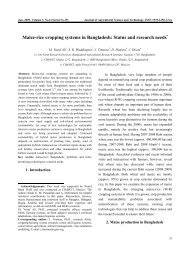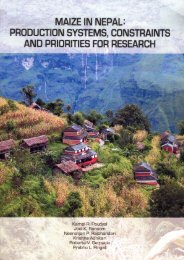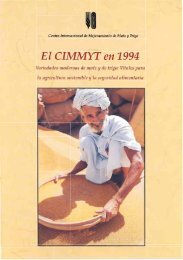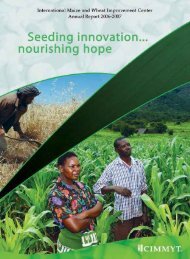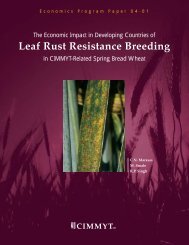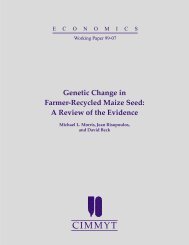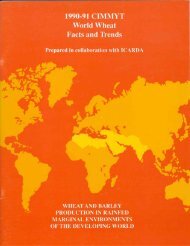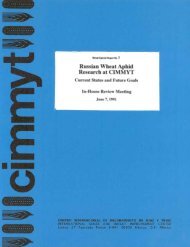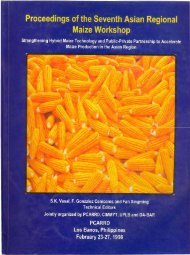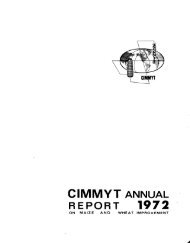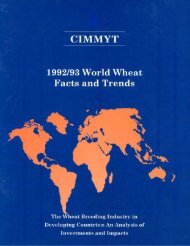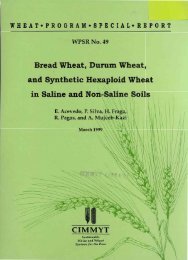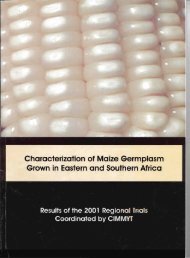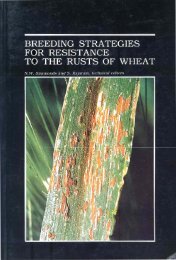- Page 2 and 3:
Proceedings of the Fifth Asian Regi
- Page 4 and 5:
Page Foreword List of participants
- Page 6 and 7:
For several years, the Asian countr
- Page 9 and 10:
LAOS MALAYSIA MYANMAR NEPAL PAKISTA
- Page 11 and 12:
Chamnan Chutkaew Dept. of Agronomy
- Page 13 and 14:
I t· PRIVATE PRIVATE SECTOR: SECTO
- Page 15 and 16:
Pioneer Overseas Corp. ProAgro Seed
- Page 17 and 18:
MP COP NGOs TK = Muriate of Potash.
- Page 19 and 20:
Table 3. Land suitability for maize
- Page 21 and 22:
Depending on how this wheat is rele
- Page 23 and 24:
Individual field sizes in the GKF a
- Page 25 and 26:
Table 12. Demonstration block resul
- Page 27 and 28:
alance of composite, synthetics and
- Page 29 and 30:
Elias, S.M., F.S. Sikder and J.Ahme
- Page 31 and 32:
~IZE ItAIMJ4ENT PRXJW4ME IN IHlf'AN
- Page 34 and 35:
3. Low level of soil fertility. Exp
- Page 36 and 37:
3. Farmers could not afford to purc
- Page 38 and 39:
Table 1. Hybrid maize production in
- Page 40 and 41:
100,000 mu (1 ha = 15 mu). Fran 198
- Page 42 and 43:
+ The planting area of inbred line
- Page 44 and 45:
ty levels. Selection interia should
- Page 46 and 47:
Dao13, Oa19, SSE232 etc.). b. combi
- Page 48 and 49:
~ZE I~ IN IN>IA - AN OVERVIEW WITH
- Page 50 and 51:
inbred 1ines possessing good genera
- Page 52 and 53:
Table 3. Details of medium and earl
- Page 54 and 55:
increasing the yield levels of the
- Page 56 and 57:
Production of ~zygous diploid inbre
- Page 58 and 59:
EntQllOlogical research. In the fie
- Page 60 and 61:
A 1) OUr coordinated efforts for ma
- Page 62 and 63:
Table 1. Maize area harvested, proW
- Page 64 and 65:
Table 4. Grain yield of Semar 1 and
- Page 66 and 67:
ut they have been selecting ears fr
- Page 68 and 69:
MAIZE ~ N«J ~ION IN LAOS. Kanyavon
- Page 70 and 71:
to rice in order to reach self-suff
- Page 72 and 73:
0\ 0\ ."'0- ~I.u'. u: 0 50 100 STAT
- Page 74 and 75:
. According to the findings of the
- Page 76 and 77:
IR:EDIIIG IHJ N:RHJotIC RESEAfDI C
- Page 78 and 79:
tion with estate or mini-estate typ
- Page 80 and 81:
Table 4. MYR grain maize yields ove
- Page 82 and 83:
techniques. References Anonymous. 1
- Page 84 and 85:
Table 1. Total area under maize and
- Page 86 and 87:
Year Township Area planted Total pr
- Page 88 and 89:
cover, short plant stature, and sat
- Page 90 and 91:
Table 3. Res.Stat. Multilocational
- Page 92 and 93:
3. Plant protection: a. Diseases Th
- Page 94 and 95:
Questions to the author: FROM: S. K
- Page 96 and 97:
were unacceptable in some parts due
- Page 98 and 99:
Table 2. CCRI maize hybrid yield tr
- Page 100 and 101:
HYBRID MAIZE BREEDlt.G AN> ALH»DII
- Page 102 and 103:
of highly productive technologies,
- Page 104 and 105:
Maize varietal improvement continue
- Page 106 and 107:
Peronosc lerospora phi 1ippinensis
- Page 108 and 109:
elow to help clarify the farm level
- Page 110 and 111:
Premium Grade (emulsifiable concent
- Page 112 and 113:
support. The versatile planter/fert
- Page 114 and 115:
Table 1. Climatic conditions in the
- Page 116 and 117:
T1l1t:i----------------------------
- Page 118 and 119:
the maha season. Yala season is cha
- Page 120 and 121:
. Spacing Blackgram Maize 40 em x 5
- Page 122 and 123:
Sri Lanka. Ariyanayagam, R. P. 1967
- Page 124 and 125:
It took almost 10 years to develop
- Page 126 and 127:
g; CUS0 4 (5H 2 0): 0.39 g; NaF: 0.
- Page 128 and 129:
3. Making single cnosses: Plant the
- Page 130 and 131:
experiments showed that the fertili
- Page 132 and 133:
Long term evaluation of mass releas
- Page 134 and 135:
Chang, S.C., and Y.Z. Wu. 1976. Pra
- Page 136 and 137:
DEVELCHENT OF HYBRID ~ IN THAILAN>
- Page 138 and 139:
Table 2. Quantity and value of Thai
- Page 140 and 141:
was approved by KU and OOA in 1991
- Page 142 and 143:
Table 8. Mean yields of fresh dehus
- Page 144 and 145:
4. Prevention and control of aflato
- Page 146 and 147:
Table 17. Mean grain yield and agro
- Page 148 and 149:
Sittipanuwong, S., C. Chutkaew, A.
- Page 150 and 151:
Early rainy season plantings have a
- Page 152 and 153:
P. R.CHINA TMilAKD CAMPUCHiA
- Page 154 and 155:
In 1992, the hybrid maize acreage i
- Page 156 and 157:
organizing visits as well as field
- Page 158 and 159:
Table 1 Area, production and yield
- Page 160 and 161:
plants per hill) 4. Intercropping e
- Page 162 and 163:
VIEl1'W4 YELLOW MAIZE EXRRT: MARKET
- Page 164 and 165:
6,------------------~3,5 Producllon
- Page 166 and 167:
MAIZE BREEDUG Arnel R. Hallauer-L!
- Page 168 and 169:
method was provi ded by Eberhart (1
- Page 170 and 171:
can vary by the complexity of inher
- Page 172 and 173:
Table 3. Response to selection for
- Page 174 and 175:
Table 5. Comparative responses for
- Page 176 and 177:
increased response for grain yield.
- Page 178 and 179:
Sure Crop (0h43 and C103). several
- Page 180 and 181: Sprague and Tatum (1942) demonstrat
- Page 182 and 183: Horner, E.S., E. Magloi re, and J .
- Page 184 and 185: evaluation are conducted in only on
- Page 186 and 187: Table 1. Maize: Production Unit 100
- Page 188 and 189: Table 3. Maize: Area harvested Unit
- Page 190 and 191: v) Incentives to private sector are
- Page 192 and 193: possible through adoption of suitab
- Page 194 and 195: will be described highlighting thos
- Page 196 and 197: will fluctuate. As a general rule,
- Page 198 and 199: help of maize breeders from the nat
- Page 200 and 201: Table 4. Possible heterotic partner
- Page 202 and 203: use as OPVs and broad based synthet
- Page 204 and 205: c. Integrat;on of populat;on ;mprov
- Page 206 and 207: Table 8. Announced CIMMYT lines 199
- Page 208 and 209: HYBRID MAIZE ~ 1l£ SMALL-SCALE FNI
- Page 210 and 211: Table 2. Growth rate of maize area
- Page 212 and 213: At the same time that CIMMYT was sh
- Page 214 and 215: when grown under farmers' condition
- Page 216 and 217: seed often varies substantially bec
- Page 218 and 219: kilograms of maize grain that must
- Page 220 and 221: Table 8. COst of producing, process
- Page 222 and 223: case in which the hybrid replaces a
- Page 224 and 225: J i-----1'-_.,-_I........ i M*iIBia
- Page 226 and 227: egions which do not allow a suffici
- Page 228 and 229: participation; where foreign compan
- Page 232 and 233: To recover value, seed companies ca
- Page 234 and 235: In recent years, many new companies
- Page 236 and 237: nology and its reliance on patents,
- Page 238 and 239: Table 6. Intellectual property righ
- Page 240 and 241: for crop improvement programs. It i
- Page 242 and 243: capabi 1ities Despite these constra
- Page 244 and 245: TftNlAlll CAMPUCI-1iA Fig. 1. Seven
- Page 246 and 247: * Yield potential of 8.0 t/ha. II.
- Page 248 and 249: CAOOILL MAIZE RESEAFDI ACTIVITIES I
- Page 250 and 251: RESEARCH AN> POTENTIAL OF HYBRID (X
- Page 252 and 253: ClBA SEEDS IN SJJ11£AST ASIA. Jose
- Page 254 and 255: ACTIVIlY OF MAHYOO IN INJIA Rajendr
- Page 256 and 257: PACIFIC SEEDS - PlANT ~ FOO ASIA Pe
- Page 258 and 259: Questions to the author: FROM: R. S
- Page 260 and 261: Just start In 1980 the demonstratio
- Page 262 and 263: VOLUME 1000 IQnt/ 10.--------------
- Page 264 and 265: (Notes by Dr. V.L. Chidley, Raporte
- Page 266: 1. Rhizoctonia leaf and sheath blig




